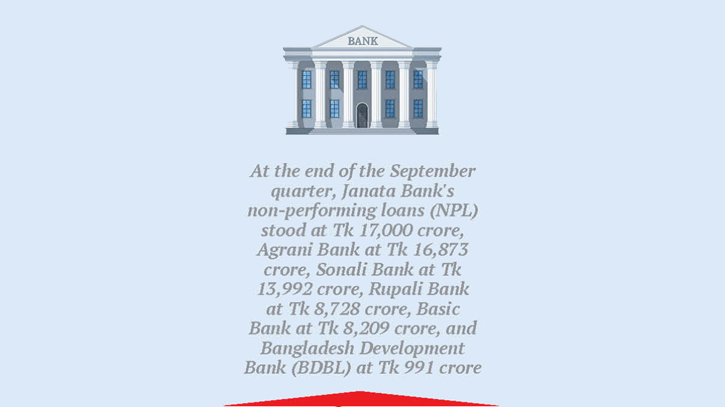
Photo : Messenger
The country has passed 52 years since gaining independence. During this period, the country's economy has witnessed significant progress. However, the state-owned banks in the country have struggled to ensure transparency. These government institutions face potential destruction due to the disbursement of anonymous loans through various irregularities and frauds.
As of the end of September this year, 21.70 percent of the loans disbursed by these banks have become defaulters. In June, the default rate was 25 percent, and at the end of December 2022, it was 20 percent.
According to the data, at the end of September this year, the disbursed loans of six state-owned commercial banks amounted to Tk 3,03,179 crore. Of this, Tk 65,797 crore was in default, accounting for 21.70 percent of the disbursed loans. By the end of December 2022, the defaulted loans of these six state-owned banks were Tk 56,460 crore, representing 20.28 percent of the loans disbursed at that time. In nine months, these banks defaulted Tk 9,337 crore.
At the end of the September quarter, Janata Bank's non-performing loans (NPL) stood at Tk 17,000 crore, Agrani Bank at Tk 16,873 crore, Sonali Bank at Tk 13,992 crore, Rupali Bank at Tk 8,728 crore, Basic Bank at Tk 8,209 crore, and Bangladesh Development Bank (BDBL) at Tk 991 crore.
Ahsan H Mansur, Executive Director of the Policy Research Institute (PRI), told The Daily Messenger, “At one time, a bank reform committee was formed, and the defaults in the banking sector decreased significantly. However, irregularities increased again from 2011.”
“There is a lack of corporate governance, so there needs to be political will to solve these problems. Perhaps the government will work on reforming the banking sector after the upcoming election, with assistance from organisations such as the International Monetary Fund (IMF) and the World Bank. However, the government's right intentions are crucial to solving these problems,” he added.
Meanwhile, the IMF has emphasised the need to reform Bangladesh's financial sector, urging the formulation of special strategies for capital recovery and the reduction of defaulted loans in state-owned banks to reduce the risk in the banking sector. The IMF has set a target for the banking sector to bring down NPL to 10 percent by 2024. Currently, most private sector banks have NPLs of less than 10 percent, while government banks have NPLs exceeding 20 percent.
According to Bangladesh Bank data, the total disbursed credit of the country's banking sector at the end of the September quarter was Tk 15,65,195 crore. Defaulted loans amounted to Tk 1,55,397 crore, which is 9.93 percent of the total disbursed loans. This amount is Tk 21,000 crore more than the same period of the previous year when the defaulted loans were Tk 1,34,396 crore.
Dr Zahid Hussain, Former Chief Economist of the World Bank Dhaka Office, told The Daily Messenger, “Corporate governance and defaulted loans are two major problems in the banking sector. It is not right to make concessions to address this major problem. A change in banking culture should be brought about through planning, and the law should be applied equally to the borrower and the lender to eliminate the problem of defaulters in the banking system.”
Messenger/Fameema








